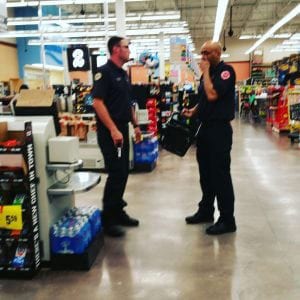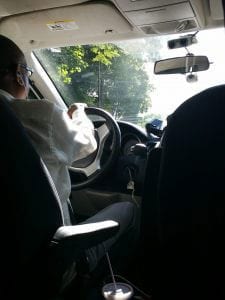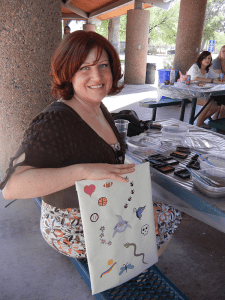If you passed me as a stranger on the street, you would never guess that there was a point in time that I road tripped around the U.S. and picked a new place to live simply by running out of money. You would also never guess that I used to do a lot of swing and salsa dancing. Let me introduce you to what it’s like for me now.
I have this bag that I go shopping with that has weathered my trips for much longer than I expected, and I call it my “Floyd” bag – as in, it’s so big that I can probably carry a whole person in it. It’s perfect, really. I don’t think the fabric can actually tear.
The top of it is lined with this heavy metal frame so it always stays open. The straps are heavily-woven nylon that after five or more years don’t show any signs of fraying. The pattern on the bag might be a little muddled and showing its age, but it’s really not bad.
I overfill it full every time I go shopping, and whomever picks me up on the short bus has to at least carry it to the outside door for me. Sometimes if they are extra helpful, they actually carry it all the way to my apartment door, but more often than not I have to find a way to get it on my bad shoulder and wobble with my cane slowly down my hallway until I can dump it at my door and drag Floyd inside.

I’ve had to call on them a time or two (or seven) for assistance, and let me tell you, there is nothing like a house full of handsome firefighters to lift your spirits when you’re having a crisis. Now, that one time when I had to call them to work and they were lifting my shirt for all of my co-workers to see was not so great – especially since one of my co-workers stopped to ask one of the guys about softball practice while they were working on me.
The short bus? I feel like I can call it that. It is short. The company name is Metro Mobility. They have contracts all over the U.S., so if I go to another city where they operate, I can ride there too as long as I make arrangements ahead of time. But since it’s my main transportation and my only link to personal freedom, I figure I can have fun with the name. I had to stop driving two years ago and sell my car, because I can’t see out of my left eye and I can’t turn my head quickly or react fast enough in traffic. Quitting driving was my call. My doctors didn’t understand my symptoms, but I knew that I was in bad shape and didn’t belong behind the wheel.

I’ve had to learn to be a really patient person. People assume that I’ve never held a job, or that I’ve had limited education, or that I’m deaf, because they can see the paralysis in my face and I use a cane to help me walk. It’s impossible for me to explain to everyone that I encounter that I, I, probably figured out the root cause of my disease – not my doctors. I am never wrong. It takes them years to catch up to me.
That is always the way of rare diseases. It’s a temptation to get a tattoo on my wrist that reads “My IQ is 140,” but I would probably be allergic to it.
The most difficult part about this is dealing with infantilism. I get a fair amount of that already because I’m a woman. Now I’m a woman with a rare disease who has been disabled by it.
I can no longer drive, so I have to rely on others to drive me – and I’m in situations where I’m in zero control. Sometimes it’s just a matter of waiting and waiting for someone to pick me up. Sometimes I have to go places I have no desire to go because others have decided for me, and since I can’t drive, I can’t make suggestions. I often feel like I’m 13 again.
It has been a huge adjustment to change what I view as my independence. It used to be my car and my courage. Now it’s my short bus and my stamina (or lack of it).
 About the Author: Patient Worthy Contributor, Chelsea. Keep an eye out for posts from her as she navigates the gnarly dating world, chronic illness and searches for a diagnosis and check out her blog, The Sick and The Dating.
About the Author: Patient Worthy Contributor, Chelsea. Keep an eye out for posts from her as she navigates the gnarly dating world, chronic illness and searches for a diagnosis and check out her blog, The Sick and The Dating.





